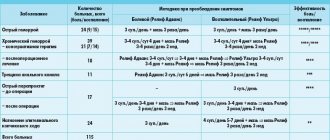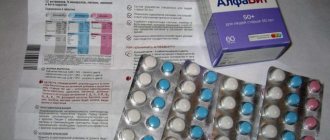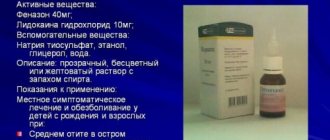It is important for nursing mothers to prevent a lack of vitamins in the body - this affects both their condition and the health of the baby. Breast milk contains not only proteins that form passive immunity, but also vitamins necessary for a newborn.
Pharmaceutical companies have developed many vitamin preparations that help women recover after childbirth and take into account their increased need for certain nutrients. These complexes can be taken not only during lactation, but also when bottle-feeding a child. At the same time, you need to monitor whether the child receives enough vitamins for normal growth and development.
Composition Complivit Mama
The film-coated tablet contains active ingredients: alpha-tocopherol acetate, thiamine hydrochloride, ascorbic acid, ergocalciferol , retinol acetate, nicotinamide, folic acid, calcium pantothenate, riboflavin, cyanocobalamin, pyridoxine hydrochloride, phosphorus, magnesium, calcium, manganese, zinc , iron in the form of fumarate, copper.
Additional components: stearic acid, povidone, talc, azorubine dye, titanium dioxide, macrogol 4000, hyprolose, sucrose, calcium stearate, tropeolin O, citric acid, potato starch, colloidal silicon dioxide.
Elevit pronatal
The complex is specially designed to take into account the increased need of women for nutrients during pregnancy and lactation. It supports a successful pregnancy and promotes well-being after childbirth.
The drug contains 12 vitamins, 3 microelements and 4 minerals:
- B12 - stimulates hematopoiesis, good for the nervous system;
- B2 - helps tissue regenerate;
- B6 - supports bone structure, healthy teeth and gums;
- A - necessary for the synthesis of proteins, mucopolysaccharides, lipids and other substances;
- B1 - normalizes the functioning of the heart and nervous system;
- C - oxidizes biologically active substances, regulates metabolic processes in tissues, blood clotting;
- D3 - maintains the balance of phosphorus and calcium;
- E - antioxidant;
- Calcium pantothenate - responsible for the metabolism of fats, carbohydrates and proteins;
- Biotin - helps digest protein;
- Nicotinamide - participates in redox processes;
- Calcium - good for bones;
- Zinc - supports the normal development of the child’s musculoskeletal system, is found in a number of hormones;
- Magnesium - needed for protein synthesis, formation of bone and muscle tissue;
- Iron - is part of hemoglobin;
- Phosphorus - good for bones and teeth;
- Folic acid.
pharmachologic effect
The complex action of the medication is ensured by the effects of all the components that make up Complivita Mama.
Specialized production technology allows you to combine several vitamins, minerals, macro- and microelements in 1 tablet.
Alpha-tocopherol acetate is an antihypoxant and can have a positive effect on the condition of muscle tissue, the nervous system, and the gonads.
Vitamin E prevents the development of hemolysis and maintains a stable state of red blood cells - erythrocytes . In early pregnancy , a lack of alpha-tocopherol acetate can lead to miscarriage.
Retinol acetate is involved in the processes of synthesis of lipids, proteins (proteins), mucopolysaccharides. Vitamin A takes an active part in most redox processes in the body.
Retinol normalizes the course of oogenesis , spermatogenesis , promotes the growth and development of the placenta, and has a positive effect on the differentiation and development of embryonic tissues (including the skeletal system, epithelial structures).
Regulates bone growth , ensures the integrity of epithelial tissue structures, normalizes visual perception (color, twilight), takes part in the formation of visual pigments.
Thiamine hydrochloride takes an active part in the functioning of the nervous system and acts as a coenzyme .
Riboflavin is the main catalyst for the processes of visual perception and cellular respiration.
Pyridoxine hydrochloride is involved in the synthesis of neurotransmitters and in protein metabolism, acting as a coenzyme. Long-term use of oral contraceptives depletes the supply of vitamin B6 in a woman’s body. The use of the medication during pregnancy allows you to compensate for the lack of pyridoxine hydrochloride caused by taking contraceptives.
Cyanocobalamin is necessary for the synthesis of myelin , participates in the processes of hematopoiesis, normal growth, epithelial development, and nucleotide .
Vitamin B12 is actively involved in the metabolism of folic acid .
Nicotinamide is necessary for tissue respiration. Vitamin PP is involved in carbohydrate and fat metabolism.
Ascorbic acid ensures the maturation of red blood cells - erythrocytes , affects the formation of hemoglobin , maintains the healthy state of the skeletal system, cartilage tissue, and teeth. A lack of vitamin C reduces the body's resistance to the effects of infectious agents and reduces resistance to inflammatory processes.
Ca pantothenate participates in the processes of oxidation and acetylation, acting as the main part of coenzyme A. Vitamin B5 helps normalize the regeneration processes of endothelial and epithelial tissues and promotes their construction.
Folic acid in the early stages of pregnancy reduces the risk of the formation of maxillofacial defects and neural tube defects in the fetus. Folic acid is required for the normal course of erythropoiesis and is involved in the processes of synthesis of nucleotides, amino acids and nucleic acids.
Iron ensures the transport of oxygen to tissues and takes part in the processes of erythropoiesis. In pregnant women, it prevents the development of anemia (the effect is pronounced in the 2nd and 3rd trimesters).
Copper strengthens the walls of arteries and veins, prevents the development of osteoporosis , hypoxia of tissues and organs , and anemia.
Manganese prevents the formation of osteoarthritis and has an anti-inflammatory effect.
Zinc ensures the complete and healthy formation of the fetal skeleton and takes part in hormone formation (including insulin ). Prevents the development of intrauterine anomalies and is necessary for tissue regeneration. Together with retinol, it promotes the formation of healthy visual perception (color and twilight vision).
Magnesium prevents preeclampsia , spontaneous delivery, and premature birth. Has a sedative effect and stabilizes blood pressure .
Phosphorus is a component of ATP, the source of cellular energy. Enhances mineralization and helps strengthen teeth and bone tissue.
Calcium takes part in the regulation of the cardiovascular system, in the transmission of neuromuscular impulses, in the contractions of smooth muscle tissue and skeletal muscles. Helps normalize blood clotting and participates in the formation of the skeletal system.
Indications
It is recommended to supplement the diet with synthetic drugs for the following reasons:
- in urban conditions it is not easy to find truly high-quality, natural products;
- a number of useful substances can only be absorbed together with microelements;
- at different times of the day, vitamins are not absorbed equally;
- heat treatment quickly destroys most vitamins;
- When taking pharmaceutical drugs, there is no need to calculate the nutrient content of food;
- Many foods high in vitamins are not recommended for nursing mothers, as they can cause an allergic reaction in the baby.
Indications for taking vitamin preparations are:
- difficult childbirth;
- toxicosis in early or late pregnancy;
- chronic diseases of the gastrointestinal tract;
- parasitic infections;
- symptoms of hypovitaminosis;
- suboptimal diet;
- high physical activity.
Lack of vitamins manifests itself in:
- deterioration of the condition of the skin, nails and hair;
- problems with teeth and gums;
- the appearance of rashes on the arms and legs;
- decreased performance, absent-mindedness, loss of appetite;
- insomnia;
- dry lips, redness of the tongue;
- frequent colds due to decreased immunity.
Interaction
The rate of absorption of fluoroquinolone antibiotics and Tetracycline from the digestive tract slows down, since the medication contains Ca and Fe.
Ascorbic acid can enhance the severity of negative reactions and the pharmacological effect of sulfonamide antimicrobial agents .
In some cases, crystalluria during joint therapy. Cholestyramine and antacids containing Mg, Ca, Al slow down the absorption and absorption of Fe.
Thiazide diuretics contribute to the development of hypercalcemia .
Consequences of hypovitaminosis for nursing mothers
In the first months of breastfeeding, the lack of vitamins in the diet is especially noticeable. After all, a young mother has to give up many foods. Honey, fish, most fruits, spices and some vegetables cause allergies or colic in the baby. Therefore, there are often situations when a woman limits herself to cereals and low-fat chicken, trying to reduce the risk of unwanted reactions in the child. The consequences of such nutrition are not long in coming:
- deficiency of B vitamins affects intestinal function, skin and hair condition;
- due to a lack of calcium, tooth enamel suffers, causing caries;
- lack of iron leads to the development of anemia, apathy and physical weakness;
- deficiency of vitamin D and ascorbic acid is manifested by decreased immunity.
Nursing mothers, whose diet is limited due to fear for the health of their infants, have a lack of almost all necessary substances. And those that enter the body with food pass into plasma and milk. The result is obvious: after a while, women's health rapidly deteriorates. Lactation due to stress and a poor diet may also decrease untimely. In the future, it is necessary to treat the consequences of restrictions in both mothers and babies. And some disorders, for example, in the functioning of the musculoskeletal system and the endocrine system, cannot always be corrected.
Many doctors recommend eliminating menu restrictions while breastfeeding. Arguing that not all allergens penetrate into milk. However, in practice, this approach often causes rejection among children. Changes in the smell and taste of milk can trigger early weaning. The solution is to use special preparations containing a range of essential nutrients. For every woman it is important to choose the one that is right for her.
special instructions
The daily amount of retinol acetate should not exceed 5000 IU during pregnancy, which must be taken into account when treating this group of patients.
The simultaneous intake of other vitamin complexes is unacceptable to prevent the development of overdose and hypervitaminosis. Riboflavin can give urine a specific amber, bright yellow hue, which does not require discontinuation of the medication and is a safe manifestation of therapy.
For additional information (instructions for use, price, reviews, etc.), see the relevant sections.
Contraindications
Although minimal, there are contraindications to taking vitamin preparations. Mainly, these are intolerance to components and hypervitaminosis.
Also, the consumption of certain nutrients is limited by diseases:
- A. May provoke an exacerbation of liver problems or gallstone disease.
- B6. Contraindicated for coronary heart disease, gastritis and peptic ulcers.
- B12. Harmful in chronic leukemia and a tendency to thromboembolism.
- C. Patients with thrombophlebitis should take it with caution.
- D. Not recommended for diseases of the cardiovascular system, gastrointestinal tract, kidneys and liver.
- PP. Undesirable for metabolic disorders and liver diseases.
Analogs
Level 4 ATX code matches:
Vitacap
Glutamevit
Bio-Max
Menopace
Lavita
Wellman
Teravit
Gerovital
Kaltsinova
Pregnakea
Oligovit
Multi-Tabs Intensive
Multi-Tabs Junior
Multi-Tabs Perinatal
Multi-Tabs Teen
Multi-Tabs Classic
Multi-Tabs Baby
Special Dragee Merz
Pregnavite
Complivit Trimester
- Berocca Plus;
- Vitrum Prenatal;
- Duovit;
- Multi-Tabs.
Reviews about Complivit Mama
On the Internet you can find various reviews about the drug. Gynecologists actively prescribe medications to compensate for vitamin deficiencies in a woman’s body during pregnancy.
Expectant mothers share their experience of use: someone notes that while taking the drug, dyspeptic disorders and constipation ; and for some patients, vitamin therapy went unnoticed, without significant side effects on the Complivit Mama vitamins. Reviews are mostly positive.
Femibion natalker 2
“Femibion Natalker 2” includes two dosage forms - tablets and capsules - with different active ingredients:
- The tablets contain 9 vitamins, folates, iodine;
- in capsules - vitamin E, docosahexaenoic acid and essential omega-3 fatty acid.
In the Femibrion Natalker 1 complex, all active ingredients are combined in 1 tablet.
The folic acid contained in both products is an important nutrient for pregnant and nursing mothers. Both the synthetic active ingredient and natural folates, which a woman receives from food, help the child develop normally. Dietary folates are found in tomatoes, lettuce, spinach, and asparagus. But, as a rule, a person does not get enough folic acid from food. And during pregnancy and lactation the need for it is increased. That is why it is worth taking additional pharmaceutical preparations containing it.
In the body, folic acid passes into its active form in approximately every second person. Metafolin, which is contained in the drug, is an easily digestible form of folate - it is already in active form.









